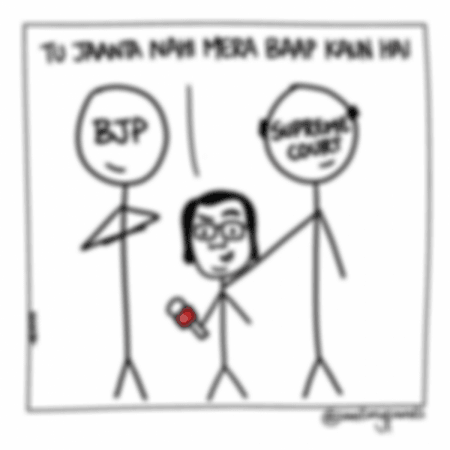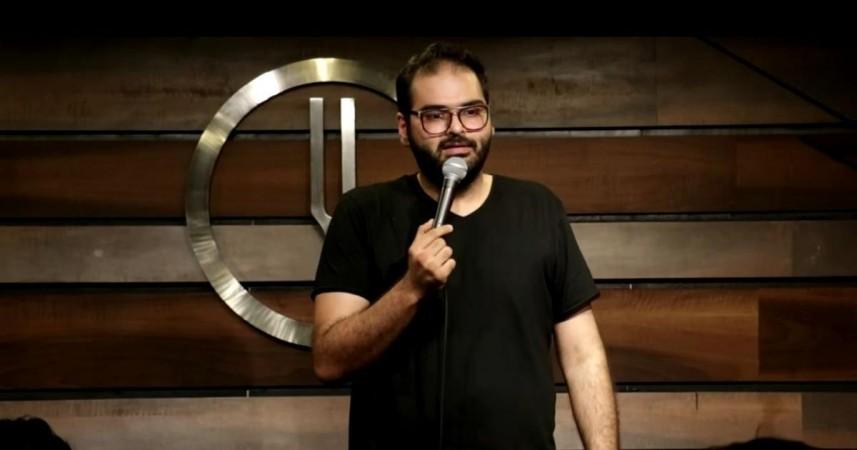On request of a law student, Attorney General of India KK Venugopal has granted his assent to initiate contempt proceedings against Rachita Taneja, creator of webcomic "Sanitary Panels", for her cartoons on Supreme Court granting bail to Republic TV Editor-in-Chief Arnab Goswami in abatement to suicide case.

The ascent from the office of India's highest legal officer comes within less than a month after he granted his consent to initiate contempt proceedings against comedian Kunal Kamra for his tweets on the same subject - bail to Goswami in the case, again on the request of a law student.
The request was filed by law student Aditya Kashyap, according to Bar and Bench.
"Audacious assault and insult to the institution"
While granting his consent, Venugopal said that Taneja's tweets were an "audacious assault and insult to the institution", adding that the tweets had a "clear implication" that the Supreme Court is biased towards ruling Bharatiya Janata Party (BJP).

The Attorney General, in his letter of consent, said that the said depiction of the Supreme Court in Taneja's tweets is a "gross insinuation of the Apex Court of this country".
"If the first tweet depicting Arnab Goswami with the Supreme Court of India and Bhartiya Janata Party by his side and with Arnab mouthing the words "Tu jaanta nahin mera baap kaun hai" were to be believed, one would have to proceed on the basis that the BJP is somehow interested in protecting Arnab Goswami and has prevailed upon the Supreme Court to do so," Venugopal wrote in his letter, according to Live Law.

Another illustration on the Supreme Court, against which assent has been granted, refers to the Supreme Court "Sanghi Court of India" and shows a saffron flag flying over the apex court building instead of the tricolour.
SC judgement in Goswami case
On November 11, the Supreme Court had granted interim bail to Goswami in a 2018 abatement to suicide case registered by the Maharashtra Police citing person liberty. During the hearing, Justice DY Chandrachud had expressed disappointment that the Bombay High Court had not intervened in the matter on grounds of personal liberty to grant bail to Goswami.
Goswami, often criticised for taking a soft approach towards BJP and criticising non-BJP governments, and two others were arrested by police in Maharashtra, a state ruled by a non-BJP coalition, on November 4 in connection with the suicide of architect-interior designer Anvay Naik and his mother in 2018 over alleged non-payment of dues by companies of Goswami and the other two accused.
During the hearing, Justice Chandrachud also wondered if abetment to suicide charges can be used only based on non-payment of dues.
Many prominent personalities including senior lawyers had aired their reservations over the Supreme Court listing Goswami's case.
Supreme Court Bar Association president Dushyant Dave had written a letter to the apex court, expressing concern over the "selective listing of matters". "The likes of Goswami get special treatment while ordinary Indians are made to suffer, including imprisonment, which are many times illegal and unauthorised," he wrote.
Contempt proceeding against Kunal Kamra
Comedian Kunal Kamra, widely known for his criticism of BJP, Hindutva groups and Central government, had landed into trouble by posting tweets criticising the Supreme Court for granting bail to Goswami and had linked his pro-BJP reporting with the court judgement.

The Attorney General had given his consent to initiated contempt proceeding against Kamra, terming his tweets to be in bad taste and that he has clearly crossed the line between humour and contempt.
"This is gross insinuation against the entirety of the Supreme Court of India — that the Supreme Court of India is not an independent and impartial institution and so too its judges, but on the other hand is a court of the ruling party, the BJP, existing for the BJP's benefit. All this in my opinion constitutes criminal contempt of court," Venugopal had said in his letter.








